
- Afhalen na 1 uur in een winkel met voorraad
- Gratis thuislevering in België vanaf € 30
- Ruim aanbod met 7 miljoen producten
- Afhalen na 1 uur in een winkel met voorraad
- Gratis thuislevering in België vanaf € 30
- Ruim aanbod met 7 miljoen producten
The Menzies Legacy E-BOOK
Ideals, change, procession, 1960s and beyond
Zachary Gorman
E-book | Engels
€ 22,36
+ 22 punten
Omschrijving
Was Robert Menzies out of step with the swinging 1960s, or did he shape the profound changes that it wrought?
Menzies led Australia for over half the decade, finally retiring in 1966 as our oldest prime minister. His reputation for stability and continuity appears opposed to everything we commonly associate with the 1960s. Yet he governed during a dynamic period marked by rising levels of homeownership, university education, opportunities for women, engagement with Asia, instantaneous communications, space exploration, international travel and trade.
These years also saw the decline of bitter sectarian divisions, an evolving Australian identity and even the introduction of a new currency. Multitudinal transformations occurred against a backdrop of stormy geopolitical tensions, involving a presidential assassination, a clandestine war with Indonesia, the introduction of conscription and the commitment of a combat battalion to Vietnam.
Australia would never be the same, but was this because of or despite Menzies? All these questions are explored in the last of a four-volume history of Menzies and his world, based on conferences convened by the Robert Menzies Institute at the University of Melbourne.
Contributors include Christopher Beer, Geoffrey Blainey, Frank Bongiorno, Nicholas Brown, Andrew Carr, Jennifer Clark, Selwyn Cornish, Gwilym Croucher, Peter Dean, Damien Freeman, David Furse-Roberts, Matilda Hatcher, John Hawkins, Anne Henderson, Sean Jacobs, David Lee, Tom Lewis, Stephen Loosley, Lucas McLennan, Lyndon Megarrity, Michael de Percy, Charles Richardson, Dean Smith, William Stoltz, James Waghorne, James Walter and Joshua Woodward.
Menzies led Australia for over half the decade, finally retiring in 1966 as our oldest prime minister. His reputation for stability and continuity appears opposed to everything we commonly associate with the 1960s. Yet he governed during a dynamic period marked by rising levels of homeownership, university education, opportunities for women, engagement with Asia, instantaneous communications, space exploration, international travel and trade.
These years also saw the decline of bitter sectarian divisions, an evolving Australian identity and even the introduction of a new currency. Multitudinal transformations occurred against a backdrop of stormy geopolitical tensions, involving a presidential assassination, a clandestine war with Indonesia, the introduction of conscription and the commitment of a combat battalion to Vietnam.
Australia would never be the same, but was this because of or despite Menzies? All these questions are explored in the last of a four-volume history of Menzies and his world, based on conferences convened by the Robert Menzies Institute at the University of Melbourne.
Contributors include Christopher Beer, Geoffrey Blainey, Frank Bongiorno, Nicholas Brown, Andrew Carr, Jennifer Clark, Selwyn Cornish, Gwilym Croucher, Peter Dean, Damien Freeman, David Furse-Roberts, Matilda Hatcher, John Hawkins, Anne Henderson, Sean Jacobs, David Lee, Tom Lewis, Stephen Loosley, Lucas McLennan, Lyndon Megarrity, Michael de Percy, Charles Richardson, Dean Smith, William Stoltz, James Waghorne, James Walter and Joshua Woodward.
Specificaties
Betrokkenen
- Auteur(s):
- Uitgeverij:
Inhoud
- Aantal bladzijden:
- 384
- Taal:
- Engels
Eigenschappen
- Productcode (EAN):
- 9780522881912
- Verschijningsdatum:
- 9/02/2026
- Uitvoering:
- E-book
- Beveiligd met:
- Adobe DRM
- Formaat:
- ePub

Alleen bij Standaard Boekhandel
+ 22 punten op je klantenkaart van Standaard Boekhandel
Beoordelingen
We publiceren alleen reviews die voldoen aan de voorwaarden voor reviews. Bekijk onze voorwaarden voor reviews.










